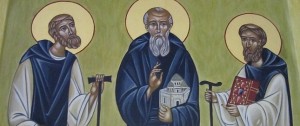Month: January 2015
Saint John Bosco
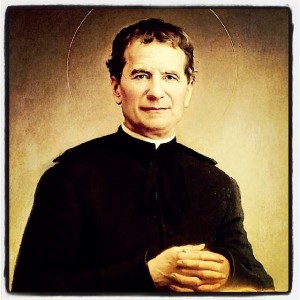 Today we have the liturgical memorial of Saint John Bosco. Prayers of gratitude for his witness and that of the Salesians.
Today we have the liturgical memorial of Saint John Bosco. Prayers of gratitude for his witness and that of the Salesians.
“Do you want our Lord to give you many graces? Visit him often. Do you want him to give you few graces? Visit him seldom. Visits to the Blessed Sacrament are powerful and indispensable means of overcoming the attacks of the devil. Make frequent visits to Jesus in the Blessed Sacrament and the devil will be powerless against you.”
“There must be no hostility in our minds, no contempt in our eyes, no insult on our lips. We must use mercy for the present and have hope for the future, as is fitting for true fathers who are eager for real correction and improvement.”
“It is easier to become angry than to restrain oneself, and to threaten a boy than to persuade him. Yes, indeed, it is more fitting to be persistent in punishing our own impatience and pride than to correct the boys. We must be firm but kind, and be patient with them.”
St. John Bosco, pray for us!
Saints in one family
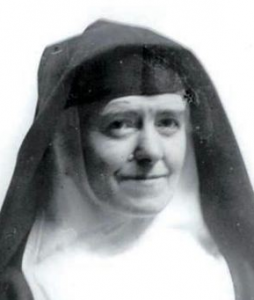 A while ago I borrowed a phrase: saints beget saints. This seems to be VERY true –even, and most importantly, in families. Of course, there there are many good examples of family members being raised to the honor of the altar. We need more witnesses to Christ Jesus as saints.
A while ago I borrowed a phrase: saints beget saints. This seems to be VERY true –even, and most importantly, in families. Of course, there there are many good examples of family members being raised to the honor of the altar. We need more witnesses to Christ Jesus as saints.
On January 25, 2015 -news was received that another member of the famous Martin family will be studied for a proposal for beatification and canonization. In history she was known as Léonie Martin, in religion she took the name of Sister Françoise-Thérèse. She was the daughter of Blessed Louis and Zelie Martin and the sister of St. Thérèse of Lisieux.
Sister Françoise-Thérèse was a professed member of the Monastery of the Visitation at Caen, France, where she died in 1941 at the age of 78.
The story: The opening of the diocesan process for Leonie’s sainthood is to be announced in France today.
Saint Thomas Aquinas
Rainbow coalition
Criminal escapes Capuchin friary
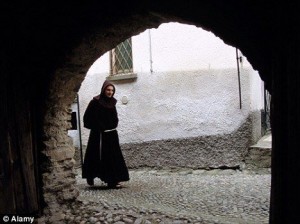 I laughed and laughed and laughed this morning when I read the story of a criminal serving his sentence with Capuchin friars pleading to be sent back to prison… because Capuchin life is too hard, he claimed! The reason for the humor is that Capuchins aren’t too known for their austerities today in North America; the Capuchin order may be strict only in a few places in the world but…may be this is a wake up call to the Friars Minor Capuchin (and others)…
I laughed and laughed and laughed this morning when I read the story of a criminal serving his sentence with Capuchin friars pleading to be sent back to prison… because Capuchin life is too hard, he claimed! The reason for the humor is that Capuchins aren’t too known for their austerities today in North America; the Capuchin order may be strict only in a few places in the world but…may be this is a wake up call to the Friars Minor Capuchin (and others)…
I got this story via a friend:
Austere existence: A convicted criminal serving out his sentence in a Sicilian monastery run by Capuchin monks has escaped for the second time and asked to be sent back to prison because life there was too tough .
Thief David Catalano, 31, was sent to a Santa Maria degli Angeli community run by Capuchin monks in Sicily last November.
But he found their austere lifetstyle too tough to handle and soon escaped. After a short while on the run he was caught by police and sent back.
On Monday he fled for the second time in six weeks, only to swiftly turn himself in at a police station and beg officers to send him back to jail in the nearby town of Nicosia.
He told the stunned policemen: ‘Prison is better than being at that hostel run by monks.’
A police spokesman said: ‘Catalano arrived out of the blue and said there was no way he could stay on with the monks.
‘He said it was too tough and he wanted to go back to prison, so we happily obliged and he is now back behind bars serving the rest of his sentence.
‘Life with the monks can be pretty tough – there are no mod cons and they are up early and go to bed early. There are no luxuries at the hostel and the monks run a very austere regime.’
The Santa Maria degli Angeli community is based in a monastery near Enna on the island of Sicily.
‘He said it was too tough and he wanted to go back to prison, so we happily obliged and he is now back behind bars’
It has been run as a halfway house by the Capuchin friars for more than 12 years with around 60 prisoners accommodated there as they near the end of their sentences.
Chiara Lubich’s cause for sainthood opened
Today, word was received that the Most Reverend Raffaello Martinelli, bishop of Frascati, opened the diocesan process for the cause of beatification for Chiara Lubich, foundress of the Opus Mariae (Work of Mary) – Focolare Movement. On 7 December 2013, the formal request was made by the current president of the Focolare Movement, Maria Voce, the direct successor to Chiara, to open the cause. The date of December 7th is significant because it was the 70th anniversary of the founding of the Movement. At the time of the formal request to Bishop Martinelli, Voce said: “This act invites us all to a life of greater holiness, lived day by day to contribute towards collective sanctity, that sanctity of the people so dear to Chiara’s heart.”
Chiara Lubich died on 14 March 2008. The officials of the Focolare Movement estimate that more than 120.000 have visited the sites where she lived and where her mortal remains rest.
The Movement has one their members beatified (Luce Badano) and 12 others who have their causes being studied.
Brew Evangelization –Benedictine styled
 The idea of sharing anew the beautiful, the true and the good of the Catholic faith with baptized Catholics, with other Christians, and with those justing seeking Someone greater, is popular these days. The words we are using to describe this sharing of faith is the new evangelization. Saint John Paul got the ball rolling again after a hiatus from the time of Blessed Paul VI and the Fathers of the Second Vatican Council with promoting a new way of bring the Lord’s Good News to society again. But for him the new evangelization isn’t about a program as much as it is manner of conversion.
The idea of sharing anew the beautiful, the true and the good of the Catholic faith with baptized Catholics, with other Christians, and with those justing seeking Someone greater, is popular these days. The words we are using to describe this sharing of faith is the new evangelization. Saint John Paul got the ball rolling again after a hiatus from the time of Blessed Paul VI and the Fathers of the Second Vatican Council with promoting a new way of bring the Lord’s Good News to society again. But for him the new evangelization isn’t about a program as much as it is manner of conversion.
As typical, we see the use of the word “evangelization” used in a variety of ways but without a distinct and concrete definition. In my estimation few have really grasped the concept of it means to be engaged in evangelization. So many want to bolster the numbers of people in the pews, or get parish programs going or some such thing superficial thing. The difficult task is forming in a new way invested Catholics. There are times you get the sense that the “same-old” is being repackaged: it is new wine in old wine skins. The new evangelization becomes in many places more of the ghetto mentality and a perpetuation of an immature Christianity. That’s a long way of saying that we need a more creative approach in sharing the faith in bold ways.
Certainly we don’t need gimmicks. We do, however, need an honest approach that is human connected to the divine.
The Benedictine monks are getting to the heart of what I am aiming at with the new evangelization: beer brewing for the Kingdom of God. Indeed, the brewing of beer (and drinking the beer) can be a de-regulated way of getting to the heart of the faith, getting to the creator and how He is manifested in His creation. Brewing and drinking beer is a very human experience that will penetrate the heart and mind to think a little more deeply about spiritual things and how to live for and with Christ.
Here is an article, “Brew Evangelization.” Read this fine article and the links embedded. One of my interests is to see the Benedictine charism flower again. AND it is beginning to do just that….
Jaroslav Pelikan recalled
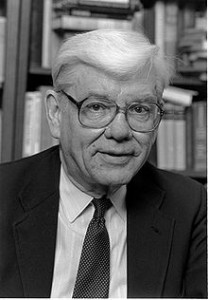 The question was asked: Who was Jaroslav Pelikan, and why does his work remain so important for serious Christian scholarship today?
The question was asked: Who was Jaroslav Pelikan, and why does his work remain so important for serious Christian scholarship today?
First Things published this essay of Timothy George, “The Legacy of Jaroslav Pelikan”: http://www.firstthings.com/web-exclusives/2015/01/jesus-on-safari
Pelikan was a seminal and inviting thinker. He did his work as a ministry and not merely making his academic career and name known. Faith and reason had a great proponent in JP. Thanks to Timothy George for a fine essay!
Dr George writes: “Jaroslav Pelikan had a love for all things human and humane, and his work still enrichs every person who looks at the world with intellectual curiosity and moral imagination. But his legacy shines especially bright among those who follow Jesus Christ, belong to his church, and see the world through the eyes of the Savior’s love.”
I seem to have been a drawn to what Jaroslav Pelikan did for the Christian faith, particularly my Catholic faith. On a personal note, Dr Pelikan is buried here in New Haven at the famed Grove Street Cemetery. Periodically, I pass by his grave to pray for him. May God grant him mercy!
Sainted Cistercian founders: Robert Molesme, Stephen Harding and Alberic
From e hymn for evening Vespers for the holy founders of Citeaux:
“Bold leader of this vast array, Saint Robert, intercede today. God grant us hearts to dream anew, and strength his kingdom to pursue.
Fond lover of that hallowed place, where brothers lived as one by grace, Saint Alberic, pray we may be one heart, one mind, in unity.
Impassioned master in Christ’s school, Saint Stephen, zealot for our rule, bid God we never build on sand, but firm in faith, on rock we stand.”
You may be aware that these saints are not honored on the Roman liturgical calendar, but revered by the monks and nuns of the Cistercian and Benedictine monasteries, are the three holy founders of Citeaux (near Dijon, France): Saints Robert Molesme (centered in the image), Stephen Harding and Alberic. They began their reform of Benedictine life in 1098. The Cistercian movement is now venerable but when it was started it was very contentious as you might expect –anytime you ask people to change you run against the tide. Think of the Prophets, or in particular, the Prophet Jonah of yesterday’s reading at Mass. Let us pray for our own conversion, and that of the Church. But also for God’s abundant grace to fall on those who have made profession to the charism of Citeaux –monks, nuns, and the laity.
The early Cistercians, impelled by a burning thirst for authenticity, wished to interpret the Rule (of St. Benedict) in the light of its monastic background and to recover its original simplicity. Their life was marked by a real detachment from the world, a love of solitude and silence, poverty and simplicity, austerity and manual labor, prayer and holy reading, all within a cenobitic framework which laid great stress upon the value of fraternal charity in the common life.
There is an attractive genuinity about this reform, which was not merely an archeologizing return to the past, but a recapturing of the primitive monastic ideal and an attempt, largely successful, to express it in structures suitable to the times.
The school of spirituality which the white monks produced, dominated by St. Bernard, is no less notable for its charming huamanity than for its authentically contemplative orientation.
Monastic Spirituality
Claude Peifer, O.S.B.



